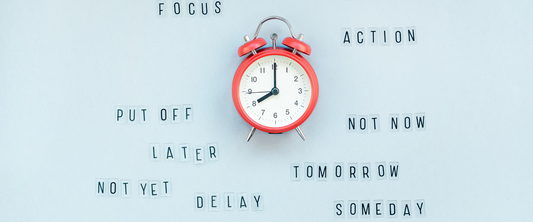Feeling overwhelmed, stressed, and anxious has become increasingly common in today's fast-paced world. However, many of these negative emotions stem from indecisiveness and procrastination. By cultivating the habits of decisiveness and taking timely action, we can significantly reduce stress and anxiety in our lives. In this blog, we will explore the power of being more decisive and ending the habit of procrastination, offering practical tips to help break free from these debilitating patterns.
Decisiveness: Embrace the Power of Choice
Being decisive creates a sense of control and empowerment, leading to reduced stress and anxiety. When we proactively make decisions, we eliminate the mental burden of constantly deliberating over options. Developing a decisive mindset involves self-awareness, trust in our abilities, and a willingness to take responsibility for the outcomes.
Tips for cultivating decisiveness:
1. Trust your intuition: Listen to your gut instincts and pay attention to your inner voice. Trust that you have the knowledge and experience to make informed choices.
2. Set clear goals and priorities: Having a clear sense of what you value and what you want to achieve can guide you in making decisions aligned with your long-term objectives.
3. Practice self-reflection: Understand your values, strengths, and weaknesses. Reflecting on past decisions can help you learn from them and make more informed choices in the future.
Procrastination: Overcoming the Paralysis
Procrastination creates unnecessary stress and anxiety as deadlines loom and tasks remain unfinished. The habit of delaying actions prevents us from fully engaging with the present moment and disrupts our ability to effectively manage our time.
Tips to overcome procrastination:
1. Break tasks into smaller steps: Break down larger tasks into smaller, more manageable actions. This makes them appear less overwhelming and allows you to tackle them one step at a time.
2. Set deadlines and stick to them: Establish realistic deadlines for tasks and hold yourself accountable for meeting them. Use techniques such as setting reminders or creating schedules to stay on track.
3. Identify and overcome obstacles: Identify the underlying causes of your procrastination. It could be fear of failure, perfectionism, or lack of motivation. Once identified, develop strategies to overcome these obstacles.
Procrastination and indecisiveness often go hand in hand, fuelling stress and anxiety in our lives. By embracing decisiveness and breaking free from the habit of procrastination, we can alleviate these negative emotions and experience a sense of control and accomplishment.
Trust your instincts, set clear goals, and take timely action to cultivate decisiveness. Break tasks into smaller steps, set deadlines, and overcome obstacles to conquer procrastination.
Remember, by embracing the power of decisiveness and banishing procrastination, you can transform your life and enjoy a greater sense of peace and fulfilment.
























